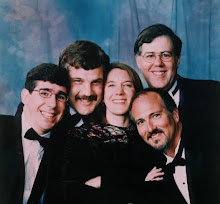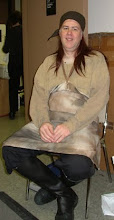Shakespeare was always a working
professional man of the theater in the late 16th and early 17th
centuries. I seriously doubt that he
ever gave any consideration to his legacy.
In fact, he seems to have made little effort to maintain any kind of
collection of his own plays. Had it not
been for friends and colleagues we would not have some of his most beautiful
and treasured plays. As a working
professional he created works often on the fly and frequently worked alongside
of other writers to complete works, especially as he got older. One of his close collaborators was John
Fletcher with whom he co-authored “Henry VIII,” “Two Noble Kinsmen” and
“Cardenio,” the lost play.
The history of “Cardenio” is really
quite interesting. The story is taken,
more or less, from the first part of Don
Quixote by Cervantes. Fletcher
and Shakespeare, it is assumed, re-worked the story and created this play. It was lost probably to fire, but seems to
have mostly survived in a work entitled “The Double Falsehood” by Lewis
Theobald. There are a lot of ins and
outs to this story, but the Royal Shakespeare Company’s Gregory Doran with his
own group of collaborators took the Theobald play and re-worked it, adding a
couple scenes in order to fill out the plot.
This play they present then as “Cardenio” the re-imagined lost play of
Shakespeare and Fletcher.
It is this work by
Fletcher/Shakespeare/Theobald and Doran (and others) that was presented by St.
Louis Shakespeare. It is a very
interesting work, especially if you know your Shakespeare. I have to say that
in reading an interview with Doran he acknowledges that he felt the play
sounded more like Fletcher’s work than Shakespeare’s and I have to concur. The use of the language is not as colorful
and evocative as is mature Shakespeare.
This work is also one of the last plays Shakespeare himself is supposed
to have worked on and I think it is most probable that most of the work is
Fletcher with Shakespeare serving as mentor/editor. For me, the dialog just didn’t sound like
Shakespeare. However there were moments
that did feel like the master. Consider
this: by this time in his career Shakespeare had mastered the ability to evoke
deep emotion, and he himself seems to have been dealing with his own personal grief,
loss and a sense of deep guilt over his virtual abandonment of his family for
all those years. This I think is
reflected beautifully in both the final scenes of “Winter’s Tale” and “The Tempest”
but I caught glimpses of it here in the speeches by Dorotea and also in some of
the sections that included Luscinda’s father Don Bernardo. Those scenes were heart wrenching and I could
hear Shakespeare himself expressing his own guilt and regret for his neglect
and selfishness as Colin Nichols expressed these words as Don Bernardo. He was easily my favorite character, and
perhaps because the character and I are both about the same age, I could really
relate to him. Colin Nichols did a beautiful job with this role. The abused, actually raped Dorotea was also
movingly portrayed by Lexie Baker. She
was able to bring us all into her grief at her horrible betrayal.
One thing I found curious about the
play was that there was a parade of references to other plays in the
canon. Certainly Dorotea’s plight and
her subsequent escape from her father’s house and the dressing as a boy
reminded me of “As You Like It.”
Rosalind’s situation is less heart-rending, and she is an aristocrat
where Dorotea is a peasant who, it is clear, has little to no recourse. Gregory Doran added the abduction scene that
felt like he took right out of “Cymbeline,” and of course, despite the fact
that Cardenio’s taking up the garb of Tom O’Bedlam is directly from Cervantes, one
can’t help but notice the strong similarity between Cardenio and Edgar in “King
Lear.” This is another reason I felt
that the play was more Fletcher than Shakespeare. The master I feel would not be so obvious
with these devices that he used to such brilliant effect in earlier plays. But for Fletcher, they are devices that
worked so why not include them.
I am thankful that I live in the
St. Louis area where we have such excellent and outstanding theater and opera
companies. St. Louis Shakespeare was
founded by Donna Northcott and is dedicated to Shakespeare and classical
plays. They have performed the entire
canon – no mean feat! Bravo to
them! I have enjoyed a few of their
performances in the past including a well done, albeit long evening of Henry
VI. This production of “Cardenio” is
really well done on a variety of levels.
First, that the company would find and be able to adapt this “lost” play
is worth celebrating. The performance of
this play gives others and me the opportunity to deepen our experience of
Shakespeare. So, Brava to Donna Northcott for doing whatever needed to be done
to secure the scripts and the rights to do this work in St. Louis. I was actually shocked that opening night was
not sold out. It should be! All of St. Louis should be packing this
theater for this play.
The sets were very well done. Functional set pieces that could be easily
moved into position worked very well. I
think they might have cut the falling leaves.
But the use of a simple set piece here and there was all that was needed
to evoke the location of the scene. The
acting was very good. All of the
principals embodied their roles and drew me into the story. I have already mentioned two members of the
cast whose work struck me as particularly outstanding. I also want to commend Jason J. Little on his
portrayal of the Don Giovanni-like Don Fernando. (That is, by the way, Tirso de Molina’s Don Juan Tenorio and not Da
Ponte, I actually found a number of resonances with the Molina in this play and
think it is possible that Fletcher might have been familiar with it). Little’s Don Fernando was suave, seductive
and innocent but capable of becoming horribly ruthless and violent when
crossed. Erik Kuhn played the betrayed
Cardenio effectively. His naïve trust in
his aristocratic superior Don Fernando leads to him to set himself up for a
terrible fall. Kuhn was effective in giving his blind and undeserved trust and
was beautifully convincing as the lover in his scenes with Luscinda. Shannon Lampkin was also deeply moving in her
portrayal of a young woman who simply has no options and to whom no one will
listen. Overruled and having her
feelings insensitively rejected by her father, her Cardenio is the only one
whom she can reach out to but she is locked away from him. Her Isabella (Measure for Measure) like refuge into a convent was convincing as
an act of desperation. Fernando’s brother Pedro was portrayed by Kevin O’Brian
who was excellent making us think in one moment that he is the good guy and
then in the next frustrating that impression with the realization that he is
also rather selfish and myopic. Despite
his sense of right and wrong pushing him, he seems to run up against this brick
wall of his aristocratic privilege. The
remainder of the cast was excellent, I have to mention Shane Signorino whose
odious Master of the Flock made that brief scene one of the most riveting in
the performance.
If I have one complaint it is this:
throughout the evening the music used was mostly taken from the album Los Ministriles: Spanish Renaissance Wind
Music. This is an older album by
the Philadelphia based early music band Piffaro. I feel that since so much of the music was
taken from this album that they should have been acknowledged in the program. If it had been only one or two cuts then
fine, but it seems to me that over half of the album was played during the
production and consequently Piffaro deserved a shout out!
Finally – SPOILER ALERT – I have to
conclude with a little reflection on the ending of this play. The denouement is well, oh so
Elizabethan/Jacobean but not necessarily Shakespearean. And this is another yet clue to Fletcher’s
dominance in the writing of the play.
Even in the problem play “Measure for Measure” Shakespeare doesn’t
really tie up all of the loose ends in such a forced manner. Isabella’s silence speaks volumes after the
long final scene during which the entire play unravels and Duke Vincencio is
seen to be the complete creep he is. The
final scene of this play, “Cardenio,” was similar to “Measure for Measure” in that
all of the plot lines were unraveled and tied up in this long final scene. And, Duke Vincencio like, Don Pedro manages
to string it out one painful secret at a time.
When we reach the end and Don Fernando is chastened and agrees (tacitly)
to behave like a good aristocrat from now on and everyone lives happily ever
after, it is just is rather completely unsatisfying. And I don’t think it will really cut it for a
modern audience. After all Dorotea was
raped! Whether or not she was in love with her rapist is irrelevant – he wooed
her with lies and manipulation and then dumped her when he got what he wanted. Luscinda fought off her rapist on multiple
occasions and even was abducted by him as her father further essentially sold
her off to the highest bidder. Even Cardenio experienced moments of mistrust of
her. That this is a typical Elizabethan ending (though not all that typical of
Shakespeare himself) is worthy of comment.
The fact is that even today with more modern works we audience members
like to nurse the fantasy of “happily ever after.” There is none here. This is a male world of dominance and abuse
of women where the men in power – whether they are an aristocratic son, a
father or even the Master of the Sheep – can sexually abuse the women they
encounter with impunity. Maybe we still
live in this world – but this world is coming to an end. Despite powerful leaders who brag about women
who “will (supposedly) let you do it” and other powerful men who use their
power to dominate and objectify women this world is coming to an end and the
sooner the better. This “lost” play
mostly by John Fletcher reminds us that there is work to do here. And that this
kind of male behavior towards women, while certainly old historically, is still
as odious today as it was then in that it ruins lives and destroys relationships.
Bravi to the company for performing
this play and for their excellent production.
And good luck with all remaining performances.
Dorotea (Lexie Baker) and Fernando (Jason J. Little) - Photo by Ron James
Bernardo (Colin Nichols), Luscinda (Shannon Lampkin), Friar (Shane Signorino) and Gerardo (Karl Hawkins) - Photo by John Lamb









